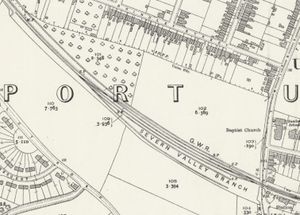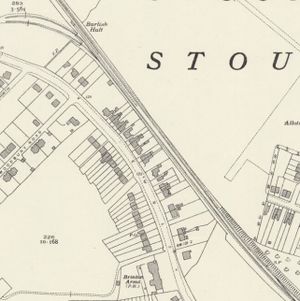Burlish Branch Junction appears in the Engineer's Line References for the Severn Valley Railway. The junction with the Severn Valley branch was situated 3 chains (66 yards) west of Stourport station, towards Bewdley in the direction of travel. The ELRs record the Burlish Branch as a 'dead end' line with a length of 42 chains, placing the northern end at the terminus of the Steatite & Porcelain Products private siding, adjacent to Burlish Halt.
Contents
Early history
From opening in 1862, the goods sidings at Stourport were originally situated east of the station. On 11 April 1913 the GWR authorised the construction of further sidings west of the station.[1] OS Maps after that time suggest these were accessed from the south only, with no north-facing connection at the north end. The two southernmost sidings faced the station and appear to have been accessed via a long head-shunt.
Extension to create the Burlish Branch
By 1939 the siding had become a long goods loop, access to the north end of which was controlled by the Park Street ground frame.[2] An extension to the original head-shunt had become a private siding for the company Steatite & Porcelain Products Ltd. The company premises opened in 1929 and were (and are) situated in the vicinity of Burlish Halt, which opened in 1930 principally to serve the works.
Steatite & Porcelain Products was established in 1907 and in 1910 incorporated as Ernst Hildebrant Ltd. It changed names in 1917 to the Clay Ring Co. Ltd. and in 1928 to Steatite & Porcelain Products Ltd. It was acquired in 1941 by ICI Metals Division and in 1964 by Morgan Advanced Ceramics Ltd (now Morgan Advanced Materials plc).[3]
See also
References
- ↑ Marshall (1989) p. 90.
- ↑ Mitchell & Smith (2007), fig 7
- ↑ Grace's guide to British Industry webpage (retrieved 7 October 2018)



